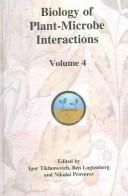| Listing 1 - 4 of 4 |
Sort by
|
Book
ISBN: 9783319085753 3319085743 9783319085746 3319085751 Year: 2015 Publisher: Cham : Springer International Publishing : Imprint: Springer,
Abstract | Keywords | Export | Availability | Bookmark
 Loading...
Loading...Choose an application
- Reference Manager
- EndNote
- RefWorks (Direct export to RefWorks)
Plants interact with small organisms in their environment, such as bacteria, fungi, oomycetes, nematodes and insects. Some of these can cause diseases and pests whereas others can have a plant-beneficial action, such as (i) protecting plants against diseases, (ii) enhancing plant growth and productivity, (iii) reducing plant stresses caused by attackers, draught and salts, and (iv) cleaning soils from pollutants. Our understanding of plant-microbe interactions advances rapidly and the application of beneficial microbes in agriculture and horticulture - presently USD 1.7 billion annually - is increasing fast. Therefore, there is a strong need to present the principles of these interactions to a broad public. In this book, the basics of all interactions mentioned above are explained in an easily understandable way. Modern state-of-the-art technology on visualization of these interactions and on DNA techniques will be highlighted. Successful examples of progress are presented in the section “Paradigms of Plant-Microbe Interactions”. Finally, a number of innovative ongoing research projects will be presented. Presently, plants are mainly protected from diseases and pests by using agrochemicals. However, many of these chemicals pollute the environment and can be a health threat for animals and humans. This book show that microbes can help to reduce chemical input and can also be used in combination with chemicals, or even replace agrochemicals. It is generally accepted that the use of microbes will cause a breakthrough in agriculture and horticulture, making it more sustainable in a cost-effective way. Major chemical companies are buying microbial biotech companies. This book is aimed at everybody working in or interested in one of the many fields of plant-microbe interactions and who wants to become quickly familiar with (other) aspects of this broad field.
Life Sciences. --- Plant Ecology. --- Microbiology. --- Plant Physiology. --- Life sciences. --- Plant physiology. --- Sciences de la vie --- Microbiologie --- Physiologie végétale --- Plant and Crop Sciences. Diseases, Pests and Disorders of Plants --- Host Parasite Relationships --- Microbe-Plant Relations --- Botany --- Earth & Environmental Sciences --- Plant Ecology --- Microbe-Plant Relations. --- Plant-microbe relationships. --- Plant-microbe interactions --- Plant ecology. --- Plants --- Microbiology --- Microbial biology --- Biology --- Microorganisms --- Ecology --- Physiology --- Phytoecology --- Vegetation ecology --- Floristic ecology
Digital
ISBN: 9783319085753 9783319085760 9783319085746 9783319381855 Year: 2015 Publisher: Cham Springer International Publishing
Abstract | Keywords | Export | Availability | Bookmark
 Loading...
Loading...Choose an application
- Reference Manager
- EndNote
- RefWorks (Direct export to RefWorks)
Plants interact with small organisms in their environment, such as bacteria, fungi, oomycetes, nematodes and insects. Some of these can cause diseases and pests whereas others can have a plant-beneficial action, such as (i) protecting plants against diseases, (ii) enhancing plant growth and productivity, (iii) reducing plant stresses caused by attackers, draught and salts, and (iv) cleaning soils from pollutants. Our understanding of plant-microbe interactions advances rapidly and the application of beneficial microbes in agriculture and horticulture - presently USD 1.7 billion annually - is increasing fast. Therefore, there is a strong need to present the principles of these interactions to a broad public. In this book, the basics of all interactions mentioned above are explained in an easily understandable way. Modern state-of-the-art technology on visualization of these interactions and on DNA techniques will be highlighted. Successful examples of progress are presented in the section “Paradigms of Plant-Microbe Interactions”. Finally, a number of innovative ongoing research projects will be presented. Presently, plants are mainly protected from diseases and pests by using agrochemicals. However, many of these chemicals pollute the environment and can be a health threat for animals and humans. This book show that microbes can help to reduce chemical input and can also be used in combination with chemicals, or even replace agrochemicals. It is generally accepted that the use of microbes will cause a breakthrough in agriculture and horticulture, making it more sustainable in a cost-effective way. Major chemical companies are buying microbial biotech companies. This book is aimed at everybody working in or interested in one of the many fields of plant-microbe interactions and who wants to become quickly familiar with (other) aspects of this broad field.
General microbiology --- General ecology and biosociology --- Plant physiology. Plant biophysics --- systematische plantkunde --- microbiologie --- insecten
Book
ISBN: 3540171835 3642716547 3642716520 Year: 1986 Publisher: Berlin Springer
Abstract | Keywords | Export | Availability | Bookmark
 Loading...
Loading...Choose an application
- Reference Manager
- EndNote
- RefWorks (Direct export to RefWorks)

ISBN: 0965462536 Year: 2004 Publisher: St. Paul, Minn., USA : International Society for Molecular Plant-Microbe Interactions,
Abstract | Keywords | Export | Availability | Bookmark
 Loading...
Loading...Choose an application
- Reference Manager
- EndNote
- RefWorks (Direct export to RefWorks)
Plant-microbe relationships --- Relations plante-microbe --- Congresses --- Congrès --- Congrès
| Listing 1 - 4 of 4 |
Sort by
|

 Search
Search Feedback
Feedback About UniCat
About UniCat  Help
Help News
News